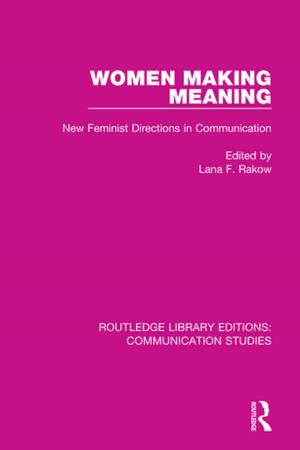Ways of Knowing in Early Modern Germany
Johannes Praetorius as a Witness to his Time
Fiction & Literature, Literary Theory & Criticism| Author: | Gerhild Scholz Williams | ISBN: | 9781351873529 |
| Publisher: | Taylor and Francis | Publication: | September 29, 2017 |
| Imprint: | Routledge | Language: | English |
| Author: | Gerhild Scholz Williams |
| ISBN: | 9781351873529 |
| Publisher: | Taylor and Francis |
| Publication: | September 29, 2017 |
| Imprint: | Routledge |
| Language: | English |
Gerhild Scholz Williams's Ways of Knowing in Early Modern Germany: Johannes Praetorius as a Witness to His Time, reviews key discourses in eight of Praetorius's works. She introduces the modern reader to the kinds of subjects, the intellectual and spiritual approaches to them, and the genres that this educated and productive German scholar and polymath presented to his audience in the seventeenth century. By relating these individual works to a number of contemporaneous writings, Williams shows how Praetorius constructed a panorama in print in which wonders, the occult, the emerging scientific way of thinking, family and social mores are recurrent themes. Included in Praetorius's portrait of the mid-seventeenth-century are discussions of Paracelsus's scientific theories and practice; early modern German theories on witchcraft and demonology and their applications in the seventeenth century. Furthermore, we read about the early modern beginnings of ethnography, anthropology, and physical geography; gender theory, early modern and contemporary notions of intellectual property, and competing and sometimes conflicting early modern scientific and theological explanations of natural anomalies. Moreover, throughout his work and certainly in those texts chosen for this study, Praetorius appears before us as an assiduous reporter of contemporary European and pan-European events and scientific discoveries, a critic of common superstitions, as much a believer in occult causes and signs and in God's communication with His people. In his writings, in his way of telling, he offers strategies by which to comprehend the political, social, and intellectual uncertainties of his century and, in so doing, identifies ways to confront the diverse interpretive authorities and the varieties of structures of knowledge that interacted and conflicted with each other in the public arena of knowing.
Gerhild Scholz Williams's Ways of Knowing in Early Modern Germany: Johannes Praetorius as a Witness to His Time, reviews key discourses in eight of Praetorius's works. She introduces the modern reader to the kinds of subjects, the intellectual and spiritual approaches to them, and the genres that this educated and productive German scholar and polymath presented to his audience in the seventeenth century. By relating these individual works to a number of contemporaneous writings, Williams shows how Praetorius constructed a panorama in print in which wonders, the occult, the emerging scientific way of thinking, family and social mores are recurrent themes. Included in Praetorius's portrait of the mid-seventeenth-century are discussions of Paracelsus's scientific theories and practice; early modern German theories on witchcraft and demonology and their applications in the seventeenth century. Furthermore, we read about the early modern beginnings of ethnography, anthropology, and physical geography; gender theory, early modern and contemporary notions of intellectual property, and competing and sometimes conflicting early modern scientific and theological explanations of natural anomalies. Moreover, throughout his work and certainly in those texts chosen for this study, Praetorius appears before us as an assiduous reporter of contemporary European and pan-European events and scientific discoveries, a critic of common superstitions, as much a believer in occult causes and signs and in God's communication with His people. In his writings, in his way of telling, he offers strategies by which to comprehend the political, social, and intellectual uncertainties of his century and, in so doing, identifies ways to confront the diverse interpretive authorities and the varieties of structures of knowledge that interacted and conflicted with each other in the public arena of knowing.















